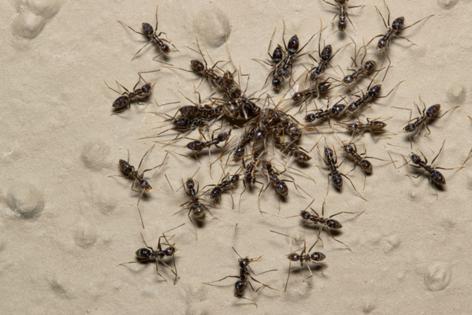FD Flam: What longhorn crazy ants can teach us about groupthink
Published in Op Eds
When scientists constructed a puzzle-solving task and pitted teams of people against teams of ants, the insects sometimes proved to be the smarter species. That’s not to denigrate human intelligence — ants are smart, and their feats of coordinated activity are rare in nature.
Still, it is fair to say the results were humbling and that ants have something important to teach us. There’s a lesson in why we sometimes fail to accomplish anything in staff meetings and why committees sometimes settle on a less effective solution to a problem than individual people could have provided.
The experiment used two versions of the same maze — one ant-sized and the other scaled to the size of a tennis court. Both species had to transport a T-shaped object — something bulky compared with their bodies — through a tricky series of openings. It was a bit like moving an awkwardly large couch through a narrow hallway or stairwell. The object had to be in just the right orientation to pass through the first opening and then rotate to pass through the second.
In videos that recently went viral, the ants — called longhorn crazy ants (Paratrechina longicornis) — danced through the exercise with such grace that even ant experts were amazed. The groups of humans appeared to bumble clumsily through the task. Some teams of ants solved the puzzle faster than some teams of humans.
Individual humans still always beat individual ants, said Ofer Feinerman, one of the authors of the research, which was published last month in the journal PNAS. But their performance vastly improved when they teamed up. Humans’ performance did not.
Yet humans have accomplished incredible feats of cooperation — we landed on the moon and built supercomputers and space telescopes as groups. Sometimes, we soar beyond what an individual could achieve, and sometimes, we get mired in groupthink. Good leadership can help, but it isn’t the whole answer.
Ants don’t choose a leader, said Feinerman, a professor at the Weizmann Institute of Science in Israel. Imagine, he said, you’re helping move furniture, and you’re in a position where you can’t see what’s ahead. You would hold up your part and move with the group. That’s what most of the ants do. But a few will periodically detach from the group and get a better view of the walls of the puzzle. Then, since they have more knowledge, they nudge things in what they think is the right direction.
The result is what Feinerman calls self-organization. The individual ants have no idea how the puzzle works, and intelligence emerges on the group level.
When allowed to communicate, human groups performed about as well as the average individual in the group, so there was no advantage to teaming up. He also tried making the humans perform under the same constraints the ants faced: They were instructed not to talk or even gesture to communicate. They did far worse.
The humans, he said, just wanted to reach consensus — so much so that they gave up on pushing their individual ideas. And the consensus was almost always the most obvious solution, not the right one. He said that happens even if 80% of the people know the correct answer. “They will not go with the majority and choose the correct thing. No, they will choose the bad and simple thing.”
Anna Dornhaus, a biologist who studies ant behavior at the University of Arizona, got an inside view of the experiment. Feinerman asked her to be one of his human subjects, and she agreed.
She said that when she and her teammates weren’t allowed to communicate, they had to decide whether to pull according to their hunches or follow others. She never knew if she was following along with the crowd or one particularly forceful individual. She knew the object would go nowhere if everyone tried to lead.
“A lot of it is about not being in paralysis because people disagree on what should be tried first,” she said. They eventually got through, but it took a couple of wrong tries.
In the real world, people have different ways of coordinating behavior. In a fast-moving restaurant kitchen, there’s often exquisite orchestration. But it’s fragile, she said, dependent on a division of labor and subject to collapse if one person can’t perform. (That’s what makes the kitchen drama The Bear so suspenseful.)
She said that ants function a little like the neurons in our brains. They also self-organize rather than following leaders, and if neurons in one area get damaged, others pick up the slack. Individual worker ants, like most cells in our bodies, can’t reproduce on their own, so there’s no evolutionary advantage to competing. People, on the other hand, always have conflicts of interest — natural selection programmed us to be selfish or altruistic, depending on the circumstances.
Crowds can be both wise and foolish, though the phenomenon known as the wisdom of the crowd only happens when large groups of people can think independently. Once they start to influence each other, they tend to ignore their wisdom in favor of consensus. Feinerman said he doesn’t necessarily think the groups of struggling humans were stupid. Nor were the individual ants. All animals are limited in different ways.
We humans are gifted with the ability to study other species and learn from them — so we can fly like birds and dive like whales. Now, we might aspire to coordinate our business meetings and other group endeavors a little more like ants.
_____
This column does not necessarily reflect the opinion of the editorial board or Bloomberg LP and its owners.
F.D. Flam is a Bloomberg Opinion columnist covering science. She is host of the “Follow the Science” podcast.
_____
©2025 Bloomberg L.P. Visit bloomberg.com/opinion. Distributed by Tribune Content Agency, LLC.




























































Comments